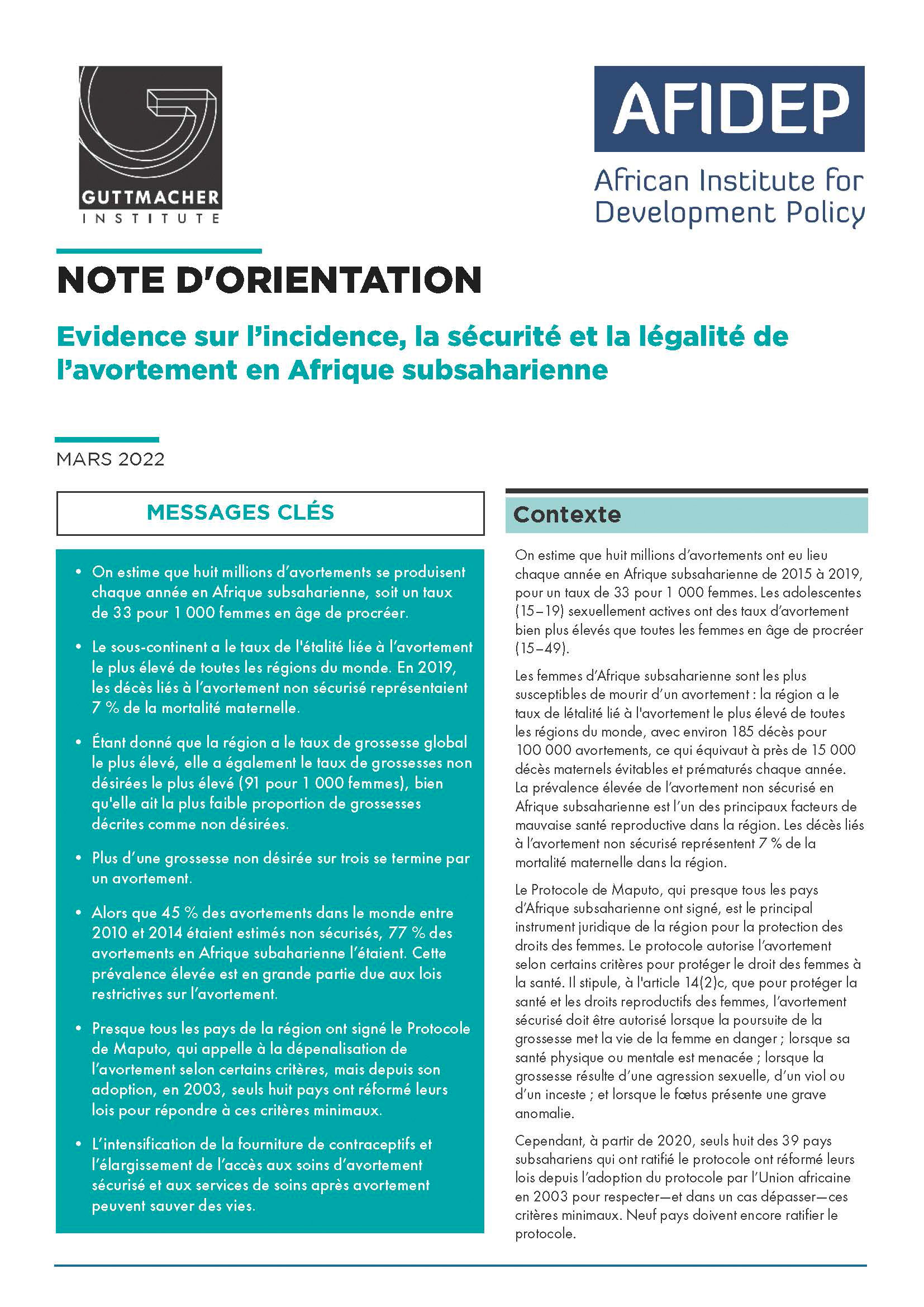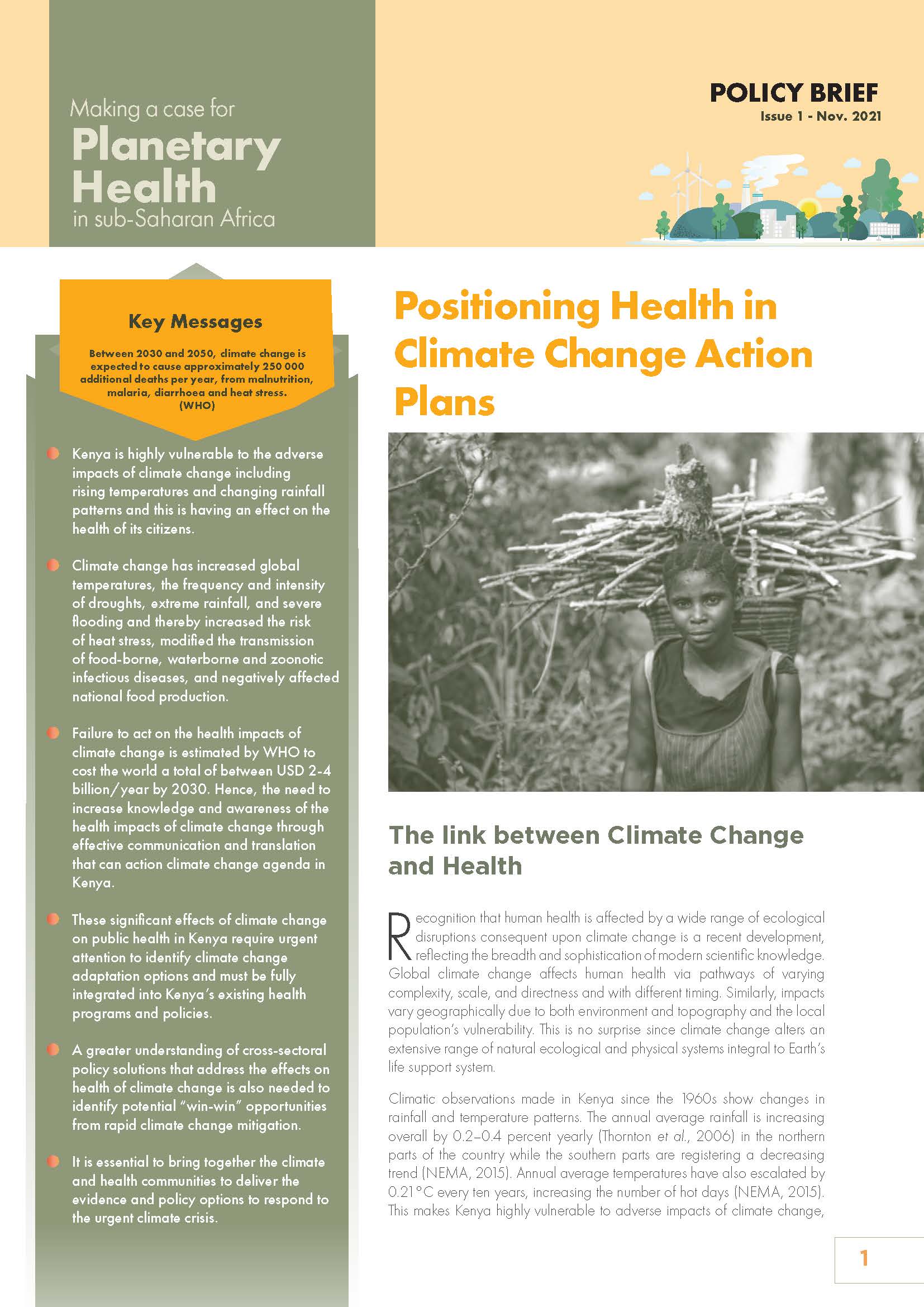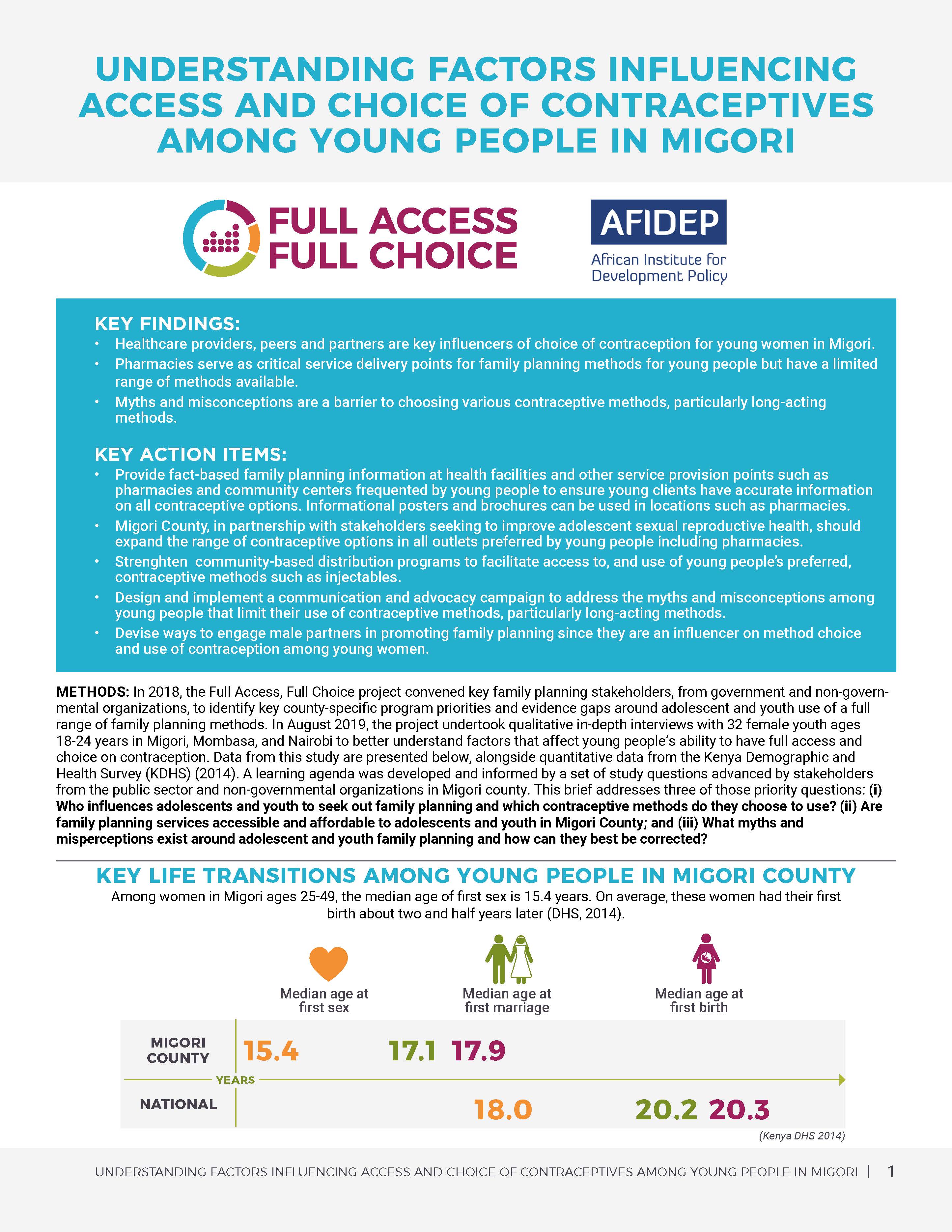Policy Briefs

In January 2021, the Guttmacher Institute released the first comprehensive compilation of evidence about abortion incidence and safety in Sub-Saharan Africa overall, as well as in each of its four subregions (Eastern Africa, Middle Africa, Southern Africa, and Western Africa). In the report titled: From Unsafe to Safe Abortion in Sub-Saharan Africa: Slow but Steady Progress, the Guttmacher Institute provides an overview of the legality of abortion and describes how often and how safely abortions occur in the region’s 48 countries. It also offers an analysis of the underlying context of abortion—namely, unintended pregnancy and access to modern contraceptives. The reports estimates […]

L’avortement à risque est un problème persistant en Afrique subsaharienne (ASS). En janvier 2021, l’Institut Guttmacher a publié la première compilation complète de preuves sur l’incidence et la sécurité de l’avortement en Afrique subsaharienne. Dans un rapport intitulé : De l’avortement à risque à l’avortement sécurisé en Afrique subsaharienne : des progrès lents mais constants, l’Institut Guttmacher donne un aperçu de la légalité de l’avortement et décrit la fréquence et la sécurité des avortements dans les 48 pays de la région. Il propose également une analyse du contexte de base de l’avortement, à savoir la grossesse non désirée et l’accès […]

Recognition that human health is affected by a wide range of ecological disruptions consequent upon climate change is a recent development, reflecting the breadth and sophistication of modern scientific knowledge. Global climate change affects human health via pathways of varying complexity, scale, and directness and with different timing. Similarly, impacts vary geographically due to both environment and topography and the local population’s vulnerability. This is no surprise since climate change alters an extensive range of natural ecological and physical systems integral to earth’s life support system.

Wide scale antimicrobial usage in animal farming accelerates antimicrobial-resistant (AMR) bacteria which is spread onto the human population that consume the products and the environment into which livestock farming wastes are released. Agricultural authorities need to regulate the use of antibiotics in farming, in general, so that the AMR bacteria risk is reduced.

Sepsis is a condition where a severe infection triggers the immune system to act in a dysregulated way, attacking the organs, causing organ damage and even death. Management of sepsis is getting better and outcomes are improving. However, fatalities are still very high in some developing countries. A study from Queen Elizabeth Central Hospital in Blantyre, Malawi provides evidence on the need to diagnose the precise bug causing sepsis, rationalise antibiotic use, and understand the longer-term outcomes of patients after they leave hospital.

In 2018, the Full Access, Full Choice project convened key family planning stakeholders, from government and NGOs, to identify county-specific program priorities and evidence gaps in adolescent and youth family planning research. This brief is in response to a learning agenda that was developed and informed by a set of study questions advanced by stakeholders from the public sector and nongovernmental organizations in West Pokot County.

In 2018, the Full Access, Full Choice project convened key family planning stakeholders, from government and NGOs, to identify key county-specific program priorities and evidence gaps in adolescent and youth family planning research. This brief is in response to a learning agenda that was developed and informed by a set of study questions advanced by stakeholders from the public sector and non-governmental organizations in Wajir County.

In 2018, the Full Access, Full Choice project convened key family planning stakeholders, from government and NGOs, to identify key county-specific program priorities and evidence gaps in adolescent and youth family planning research. This brief is in response to a learning agenda that was developed and informed by a set of study questions advanced by stakeholders from the public sector and non-governmental organizations in Nairobi County.

In 2018, the Full Access, Full Choice project convened key family planning stakeholders, from government and NGOs, to identify key county-specific program priorities and evidence gaps in adolescent and youth family planning research. This brief is in response to a learning agenda that was developed and informed by a set of study questions advanced by stakeholders from the public sector and non-governmental organizations in Mombasa County.

In 2018, the Full Access, Full Choice project convened key family planning stakeholders, from government and non-governmental organizations, to identify key county-specific program priorities and evidence gaps around adolescent and youth use of a full range of family planning methods. This brief is in response to a learning agenda that was developed and informed by a set of study questions advanced by stakeholders from the public sector and nongovernmental organizations in Migori County.

In 2018, the Full Access, Full Choice project convened key family planning stakeholders, from government and nongovernmental organizations, to identify key county-specific program priorities and evidence gaps around adolescent and youth use of a full range of family planning methods. In August 2019, the project undertook qualitative in-depth interviews with 32 female youth ages 18-24 years in Nairobi, Mombasa, and Migori, to better understand factors that affect their ability to have full access and choice on contraception. In qualitative interviews conducted by the Full Access, Full Choice project, female respondents’ perceptions of male engagement were largely shaped by relationship status.

Young people represent a diverse population with unique family planning needs and practices. The Full Access, Full Choice Project undertook qualitative in-depth interviews with 32 women ages 18-24 years in Mombasa, Nairobi, and Migori, to better understand their contraceptive journey and respond to these evidence gaps. This factsheet provides information from these counties related to dual method use, alongside quantitative data from various large-scale surveys in Kenya, including the Demographic and Health Survey (DHS) (2014) and the Kenya Population-based HIV Impact Assessment (KENPHIA) (2018).

